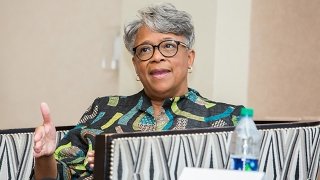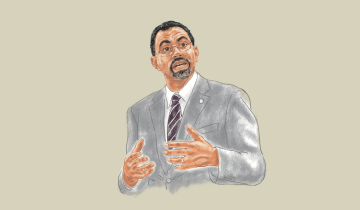Until Michelle King’s appointment in January, the Los Angeles Unified School District had not had a female superintendent since 1929.
At a panel discussion last week, King reflected upon that fact alongside fellow school administrators as they talked about how women navigate the ranks of education leadership.
“Women have to be in leadership roles so others can see them in leadership roles,” King said. That way, people get used to knowing that women can manage and make tough decisions, she explained.
The panel discussion opened this year’s annual USC Rossier Leadership Conference, which brought together education leaders from all parts of the USC Rossier community.
For the discussion, King, who is also a current student in the EdD program, joined Reveta Franklin Bowers ’70, the retired head of school at the Center for Early Education, and USC Rossier Dean Karen Symms Gallagher. Professor of clinical education Maria Ott moderated.
In a wide-ranging talk, the panelists discussed how women in education leadership move forward in their careers, balance between work and home, and achieve equity with male counterparts.
In total, 250 people attended the leadership conference co-sponsored by the Dean’s Superintendent Advisory Group, including alumni, current students and educators at many different stages of their careers. Forty speakers presented on such topics as leadership pathways and critical issues in education.
Breaking Through
Despite the fact that three-quarters of U.S. teachers are women, according to the National Center for Education Statistics, only half of principals are women, though that number has risen steadily in the past two decades. Furthermore, recent data from the School Superintendents Association suggest that women make up only a quarter of district leaders.
“We have to encourage women to be resilient and courageous and bold and want to step up,” King said.
The panelists agreed that seizing opportunities whenever possible can go a long way. Before becoming the head of the Center for Early Education at age 26, Bowers said she did a great deal of volunteer work at school, such as ordering supplies, managing the master schedule and helping organize class rosters.
“People notice when you’re doing good work, especially when you’re not asking for anything in return,” Bowers said.
Noting that some teachers are hesitant to take on leadership roles because they don’t want to leave the classroom, Gallagher suggested that being in administration means you help educate on a greater level.
“Your classroom is bigger,” she said. “It’s adults as well as kids. It’s people who are interested in the profession; it’s your colleagues and professional organizations. The skills of being a great teacher are very helpful for getting change made in organizations.”
The panelists noted that education leadership comes with certain costs, however. Like with teaching, administration consumes a huge amount of time, and educators have to be able to carve out time for their personal lives, especially when they have children of their own.
“There’s no balance. But you become skilled at managing the imbalance,” Bowers said.
Role Modeling
When the audience began asking questions, attendees peppered the panelists with requests for career advice.
Bowers repeated the wisdom her mother passed to her: look the part, act in a manner you can be proud of and have someone in your life that can help you reflect on your work.
“Develop a mirror friend,” Bowers said. “It’s somebody who will hold a mirror up when you’re not looking honestly at yourself and tell you what they see in you, which helps you become more self-reflective.”
Each panelist also addressed the difficulty of moving from being an equal to their colleagues to being an administrator, as well, suggesting that educators would be wise to commit fully to their new roles.
“I couldn’t straddle the fence between being a member of the faculty and being an administrator,” Bowers said, in regard to becoming head of school. “I stepped over the fence, but I made sure I worked harder than anyone who reported to me. I was there when they got there in the morning, and I was there when they left at night. I made sure that I worked and modeled the work ethic that I expected everybody else to have.”
That includes being able to handle any job in a school, no matter how menial the work might appear.
“I think one of the mistakes we make when we ascend to leadership is thinking that some jobs are beneath us. And if you believe that, you won’t be a successful leader,” Bowers said.




